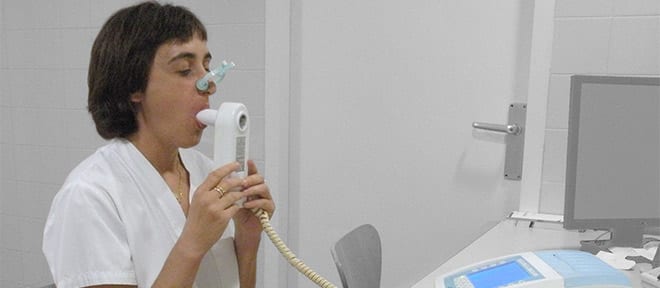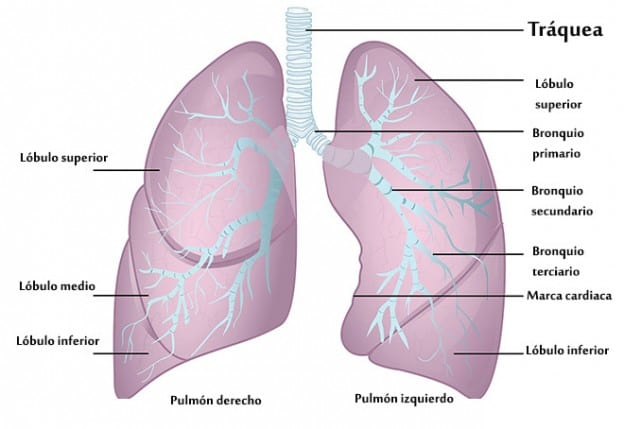Symptoms of this respiratory disease
Bronchiolitis obliterans is an inflammatory obstruction of the tiny airways of the lung called bronchioles..
Bronchioles are damaged and inflamed by chemical particles or respiratory infections.particularly after organ transplants, leading to extensive scarring that blocks the airways. This disease is sometimes referred to as constrictive bronchiolitis, a similar condition in which the small airways narrow in diameter due to inflammation and scarring.
Causes
The disease can be caused by the inhalation of irritating vapours, such as chlorine, ammonia, nitrogen oxide or sulphur dioxide. Diacetyl, a chemical used to provide a buttery flavour in many foods, is suspected of causing bronchiolitis obliterans in workers who manufacture it or mix it into foods such as butter-flavoured popcorn. Bronchiolitis obliterans can also result from respiratory infections, a connective tissue disorder such as rheumatoid arthritisThe disease can be caused by a reaction to a drug or after a bone marrow, lung or heart-lung transplant. In addition, the disease may be idiopathic (without a known cause).
Another disease with a similar name, bronchiolitis obliterans organising pneumonia, is a completely different disease.
Symptoms and diagnosis
Bronchiolitis obliterans usually causes a dry cough and shortness of breath.It can occur for two to eight weeks after exposure to toxic fumes or respiratory illness, especially on exertion. It may take several months or years to occur after transplantation.

Fatigue and wheezing in the absence of a cold or asthma are other symptoms of this lung disease.
Imaging tests (such as high-resolution chest CT) and pulmonary function tests can help detect bronchiolitis obliterans.. Chest X-rays are usually normal and pulmonary function tests may decline slowly in some types of bronchiolitis obliterans, requiring repeat medical tests and follow-up. A surgical lung biopsy, however, is the most definitive way to diagnose the disease.
Treatment of bronchiolitis obliterans
The disease is irreversible. Treatment, however, can help stabilise or at least slow its progression.. For this reason, it is important to recognise bronchiolitis obliterans early because intervention in the later stages of the disease may be ineffective.
Treatment usually involves medication therapy, primarily the use of corticosteroids. (drugs that are used to treat chronic diseases and are very good at reducing inflammation and mucus production in the airways of the lungs). In some cases, immunosuppressive therapies, which lower the body's immune response, are used, and lung transplants may be used to treat the disease.

In the case of toxic exposures, immediate removal of the irritating environment is crucial to slow the progression of the disease.
If left untreated, bronchitis obliterans can be fatal. It is the first cause of death after lung or heart-lung transplantation.
Although there is no cure for bronchiolitis obliterans scarring, corticosteroids can help clear the lungs of mucus, reduce inflammation and open the airways.
Oxygen treatments and medications to stimulate the immune system may be necessary. Breathing and stress reduction exercises can help with breathing difficulties.. In the most severe cases of lung damage, a lung transplant may be the best option.
Home care
Bronchiolitis obliterans requires additional rest and increased fluid intake.. Keeping the air in the home free of smoke and chemicals is very important. A humidifier can also help.



10 thoughts on “Tratamiento de la bronquiolitis obliterante”
I NEED TO KNOW EVERYTHING ABOUT CONSTRICTIVE BRONCHIOLITIS, IF IT IS A SERIOUS DISEASE, IF IT CAN BE CURED.
I want to know everything about constrictive bronchiolitis, as I am suffering from it and I was sent for a broschoscopy with bronchial lavage.
Good afternoon, we regret to inform you that Biosalud Day Hospital is not an online clinic. In our blog we publish information that we consider of interest but we cannot give an answer to each specific case. We recommend that you consult your specialist.
Best regards
Comments are closed.